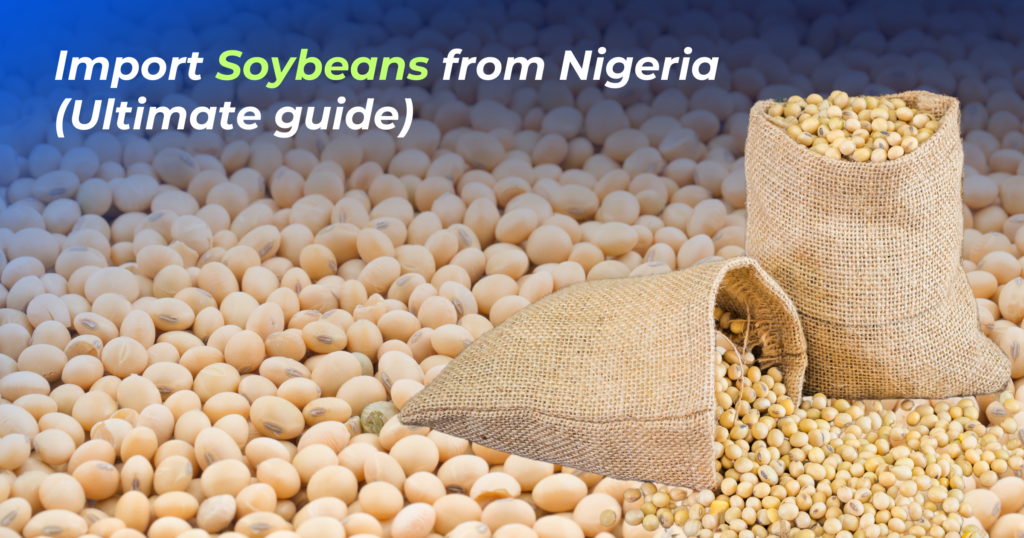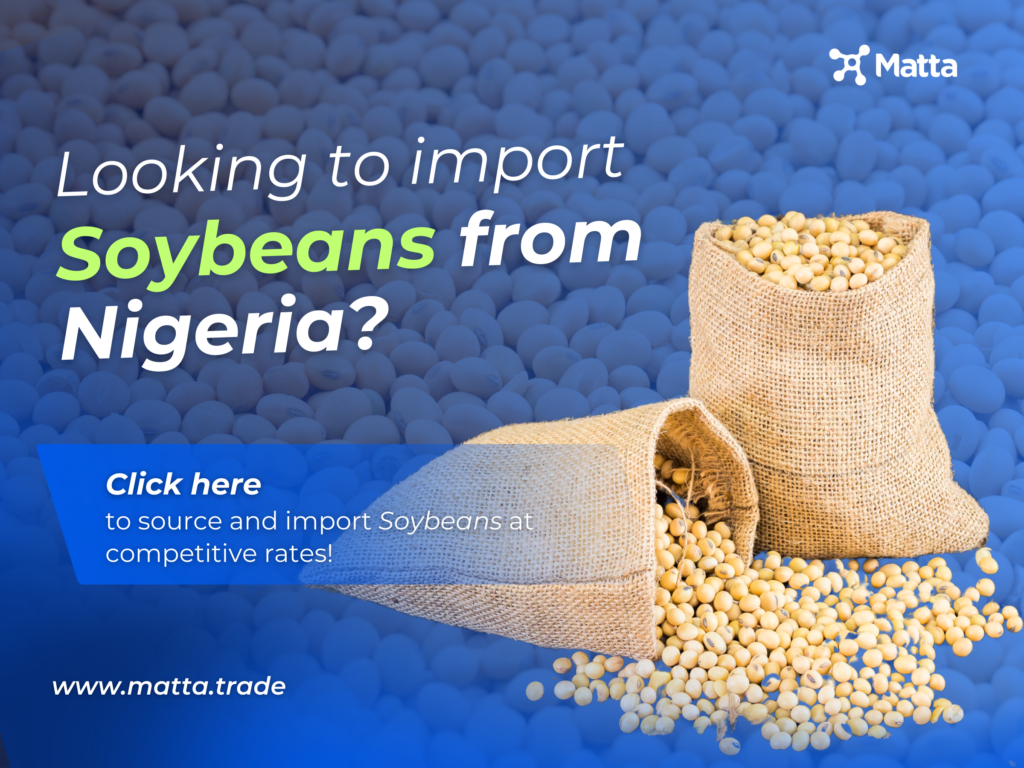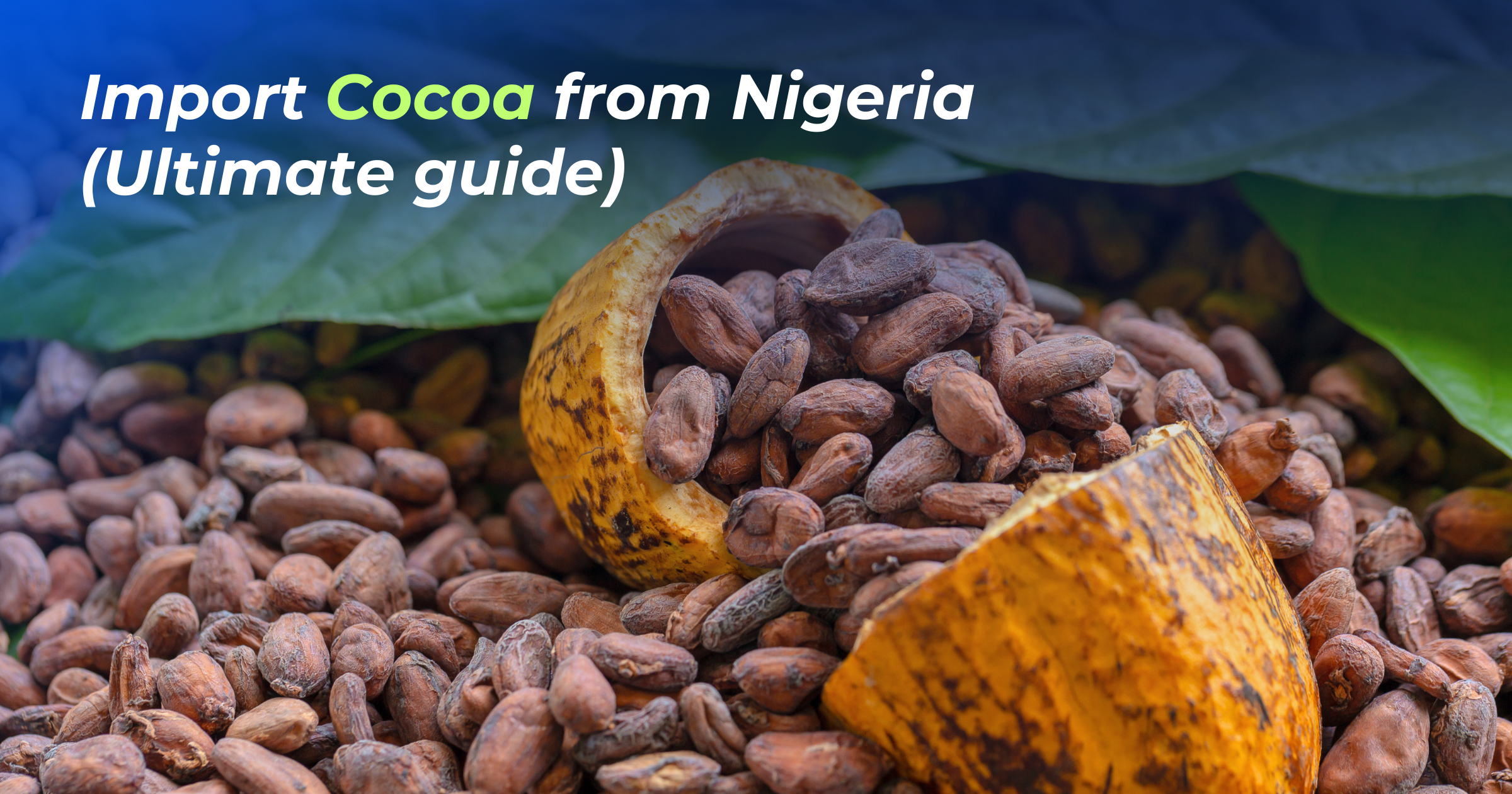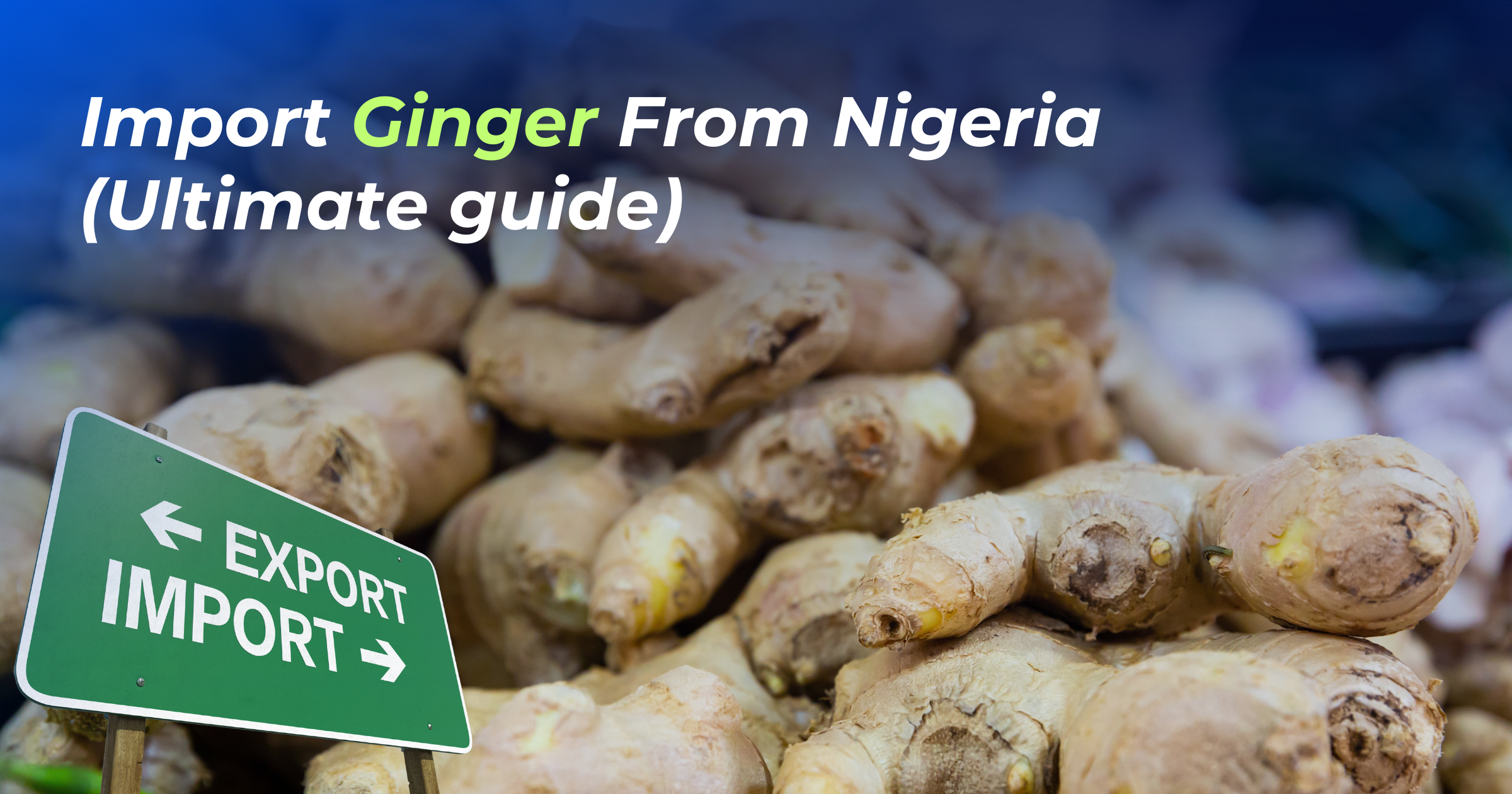
Nigeria’s soybean market is a testimony of the country’s agricultural landscape, playing a pivotal role in food security, economic growth, and international trade. With its vast arable land, favourable climate conditions, and growing domestic demand, Nigeria has emerged as a prominent exporter of high-quality soybeans, catering to global markets.
Nigeria has established a solid presence in the global agricultural export market, particularly in soybean production. Soybeans play a vital role in global trade, valued for their use in food, animal feed, and various industrial applications.
This guide explores Nigeria’s soybean industry, examining production scale, quality, and key growing regions. We highlight what makes Nigerian soybeans stand out—nutritional value, affordability, and market competitiveness.
We also provide essential insights on importing Nigerian soybeans, focusing on quality assurance, control, and risk management.
Discover how Nigeria’s soybean market offers exciting opportunities for business growth and remains a reliable supplier in the global agricultural landscape.
Soybean is a remarkable legume crop that has become a global agricultural powerhouse. Renowned for its exceptional nutritional profile, and culinary versatility, soybeans have become integral to modern food systems and economies worldwide. How did this happen?
Nutritional Profile and Health Benefits of Soybeans
Soybeans are versatile and nutrient-rich legumes, offering a wealth of nutritional benefits. They are a complete protein source, providing all nine essential amino acids the human body requires. A 100-gram serving of cooked soybeans offers around 18 grams of protein.
Soybeans are also a good source of dietary fibre, with around 6 grams per 100-gram serving. Fiber promotes digestive health, regulates blood sugar levels, and contributes to a feeling of fullness.
Soybeans contain a favourable fat profile, rich in monounsaturated and polyunsaturated fats, while low in saturated fats. These fats benefit heart health and may help reduce the risk of chronic diseases.
In addition to protein, fibre, and healthy fats, soybeans provide a range of essential vitamins and minerals, including vitamins B2, B6, K, and folate, as well as minerals like iron, magnesium, phosphorus, and potassium.
Potential Health Benefits of Soybeans
- Improved heart health: Soybeans may lower LDL (harmful) cholesterol levels and increase HDL (good) cholesterol levels, reducing the risk of heart disease.
- Enhanced bone health: Soybeans contain isoflavones, plant compounds that may help prevent bone loss and osteoporosis, particularly in postmenopausal women.
- Reduced cancer risk: Studies suggest that soy consumption may lower the risk of certain types of cancer, including breast, prostate, and colorectal cancer.
- Effective weight management: Soybeans’ high protein content can promote satiety and reduce overall calorie intake, potentially aiding in weight management efforts.
- Improved blood sugar control: Soybeans may help regulate blood sugar levels, potentially benefiting individuals with diabetes or prediabetes.
Nigeria’s Soybean Industry: A Thriving Sector with Global Reach
The global soybean market is dynamic and ever-evolving, with Nigeria emerging as a prominent player in recent years. Renowned for its high-quality soybeans, competitive prices, and diverse soybean varieties, Nigeria offers a compelling opportunity for businesses and traders seeking to import this versatile legume crop.
Nigeria’s Soybean Production Landscape
Nigeria’s soybean production has witnessed a remarkable upward trajectory, with an estimated annual output exceeding 1.5 million metric tons.
This substantial growth is attributed to several factors, including:
- Its expanding cultivation beyond its traditional region.
- Improved productivity of farmers by embracing modern agricultural practices.
- The support of government through its implemented policies and initiatives to promote soybean production.
Soybean Quality and Varietal Diversity
Nigerian soybeans are renowned for their exceptional quality, high protein, low oil, and excellent moisture levels. This quality is attributed to the country’s favourable climatic conditions, rich soil composition, and adherence to proper post-harvest handling practices.
Nigerian soybeans are not just abundant but also of superior quality. They stand out for their high protein content, essential for human nutrition and animal feed. Additionally, these soybeans are rich in other nutrients like fibre, vitamins, and minerals, making them a nutritious choice for various food products.
The quality of Nigerian soybeans is also evident in their physical attributes – they have a uniform size and a desirable colour, which are indicators of good processing and handling practices. This quality consistency is crucial for manufacturers who demand uniformity in their production processes.
Nigeria offers a diverse range of soybean varieties, each with its unique characteristics and culinary applications. These varieties include
- White soybeans: The most common variety exported from Nigeria. Equally valued for their high protein content (40-45%) and neutral flavour profile, their adaptability makes them a favourite among food manufacturers and chefs worldwide.
- Black soybeans: Known for their earthy flavour and nutritional value. Also often used in traditional dishes and as a natural food colouring. Their high anthocyanin content, a type of antioxidant, adds to their appeal.
- Brown soybeans: They balance flavour and protein content (38-42%), making them suitable for various cooking applications, including soy milk, edamame, and roasted soybeans.
As the demand for plant-based protein sources grows, Nigeria’s soybean industry is poised to play a significant role in global food markets.
Nigeria Soyabeans Export Performance
Nigeria is a significant producer and exporter of soybeans in Africa, ranking among the top 10 global soybean exporters in 2021. The country’s soybean export performance has been steadily improving in recent years, driven by favourable government policies, increased investment in soybean production, and growing demand for soybeans from domestic and international markets.
In 2021, Nigeria produced an estimated 1.8 million metric tons of soybeans, of which approximately 20% was being export. The country’s soybean exports have grown at a CAGR of 10% over the past five years, reaching $2.58 million in 2021. The main export destinations for Nigerian soybeans include Turkey, India, Pakistan, China, and the United States.
Strengths and Challenges
Several key strengths support Nigeria’s soybean export performance:
- Abundant and Fertile Land: The country boasts vast, arable land ideal for soybean cultivation.
- Growing Domestic Demand: Rising demand for animal feed and human consumption fuels both local production and exports.
- Government Support: Policies promoting soybean farming, subsidies, and infrastructure investments encourage growth.
- Investment in the Value Chain: Increased development of processing plants, storage facilities, and logistics infrastructure strengthens the industry.
- Competitive Labor Costs: Affordable labor makes Nigeria an attractive location for soybean processing and exports.
Despite these strengths, Nigeria faces challenges that limit its soybean export potential, including:
- Inadequate Infrastructure: Poor rural infrastructure hampers efficient production and export logistics.
- Limited Technology Access: Many farmers lack modern tools, reducing productivity and product quality.
- Weak Extension Services: Limited farmer education slows the adoption of improved practices.
- Global Market Uncertainty: Fluctuations in global prices and trade policies affect exports.
Opportunities for Growth
Nigeria has the potential to further expand its soybean export performance by addressing the challenges it faces and capitalising on the opportunities that exist:
- Infrastructure Development: Investing in roads, railways, and ports improves transport and logistics.
- Technology Adoption: Encouraging the use of better seeds, fertilisers, and irrigation boosts productivity.
- Enhanced Extension Services: Expanding farmer education ensures improved practices and yields.
- Market Diversification: Exploring new export markets reduces exposure to global price changes.
- Value-Added Processing: Producing soy oil, flour, and other products increases export value.
By addressing these challenges and pursuing these opportunities, Nigeria can further enhance its soybean export performance and contribute to its economic growth and food security.
Geographical Distribution of Soybean Production in Nigeria
Significantly, Nigeria’s soybean industry thrives across diverse regions, each contributing significantly to national output with unique strengths.
North Central Region
- Benue State: The largest producer, contributing over 30% of Nigeria’s total output, with ideal lowland climates and rich soils.
- Plateau State: Known for high-yield varieties and mechanized farming, Plateau benefits from its cool climate and well-drained soils.
- Kogi State: With vast arable land, Kogi is expanding production through modern agricultural practices.
North West Region.
- Kaduna State: A major supplier of black soybeans, exporting to global markets.
- Kano State: Specializes in white soybeans, strategically positioned near transport routes.
- Katsina State: Boosts production with extensive arable land and efficient farming methods.
South West Region
- Oyo State: Focuses on brown soybean varieties, thriving in lowland areas with fertile soils.
- Osun State: Supports production through agricultural diversification programs.
- Ogun State: Proximity to major markets and strong infrastructure aids growth.
This regional diversity showcases Nigeria’s potential to expand soybean production to meet growing domestic and international demand.
Benefits of Importing Soybeans from Nigeria
1. Competitive Prices: Production costs are relatively low compared to other major soybean-producing countries.
2. High-Quality Soybeans: Nigeria’s soybeans boast high protein content, low oil content, and excellent moisture levels, due to its favourable climates and rich soil.
3. Diverse Soybean Varieties: Nigeria offers many soybean varieties, including white, black, and brown soybeans.
4. Growing Production Capacity: Nigeria’s soybean production expansion indicates a growing supply of high-quality soybeans for international markets.
5. Favorable Trade Relations: Nigeria maintains trade relations with significant soybean importing countries, such as China, Europe, and Southeast Asia, facilitating smooth trade and logistics.
6. Economic Benefits for Nigeria: Importing soybeans from Nigeria can contribute to the country’s economic growth by supporting soybean producers, expanding export earnings, and promoting job creation in the agricultural sector.
7. Sustainable Practices: Nigerian soybean production is generally considered sustainable due to the country’s emphasis on efficient water and fertiliser usage and the ability of soybeans to fix nitrogen in the soil.
8. Diversification of Supply Chains: Importing soybeans from Nigeria can diversify supply chains and reduce dependence on a single source of soybeans.
9. Access to Exclusive Varieties: Nigeria offers unique soybean varieties that are not readily available from other major exporters.
10. Support for Local Innovation: Importing soybeans from Nigeria can support the development of local soybean processing industries and the creation of value-added soybean products.
Regulatory Framework for Importing Soybeans from Nigeria
Importing soybeans from Nigeria involves navigating a comprehensive regulatory framework to ensure product quality, compliance with international standards, and export procedures. Various agencies oversee this framework, each playing a crucial role in maintaining the integrity of the Nigerian soybean export industry.
Key Regulatory Agencies
- Nigeria Export Promotion Council (NEPC): The NEPC promotes Nigerian agricultural products exports, providing guidance and support to exporters, access to international markets, and export regulations compliance.
- Standards Organisation of Nigeria (SON): SON is responsible for setting and implementing quality standards for Nigerian exports. It conducts inspections and issues certificates of conformity to ensure that international standards are met.
- National Agency for Food and Drug Administration and Control (NAFDAC): NAFDAC regulates the production, importation, and exportation of food and drugs, including soybeans. It ensures that exported soybeans are contaminant-free and adhere to food safety regulations.
Export Procedures for Soybeans
To export soybeans from Nigeria, exporters must:
- Register with the NEPC: Obtain an exporter’s license from the NEPC to legally engage in soybean export activities.
- Comply with SON Quality Standards: Ensure that exported soybeans meet the quality standards set by SON. Obtain a certificate of conformity from SON upon inspection.
- Adhere to NAFDAC Food Safety Regulations: Ensure that exported soybeans are free from contaminants and meet NAFDAC’s food safety requirements.
- Obtain Phyto-Sanitary Certificate: Procure a phytosanitary certificate from the Federal Department of Agriculture (FDA) to certify that soybeans are free from pests and diseases.
- Complete Export Documentation: Prepare the necessary export documentation, including the invoice, packing list, bill of lading, and certificate of origin.
- Clear Customs: Clear the soybeans through customs by providing the required documentation and paying applicable duties and taxes.
By adhering to these regulatory frameworks and following established procedures, businesses and traders can successfully import soybeans from Nigeria and contribute to the growth of the global soybean market.
Wrapping up
Soybeans have undoubtedly transformed from a humble Asian legume into a global agricultural and culinary phenomenon.
Their exceptional nutritional value, culinary versatility, and economic significance have solidified their position as an indispensable ingredient in modern food systems and economies worldwide.
As the world continues to seek sustainable food solutions and alternative protein sources, the soybeans industry in Nigeria is well-position to play an even more crucial role in shaping the future of food and agriculture.
Thank you for reading. We hope you learned a thing or two.



